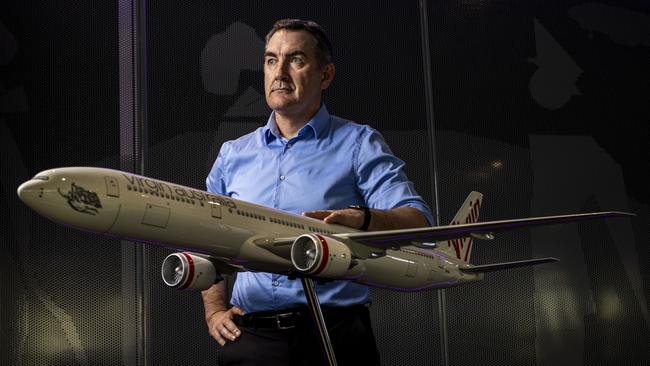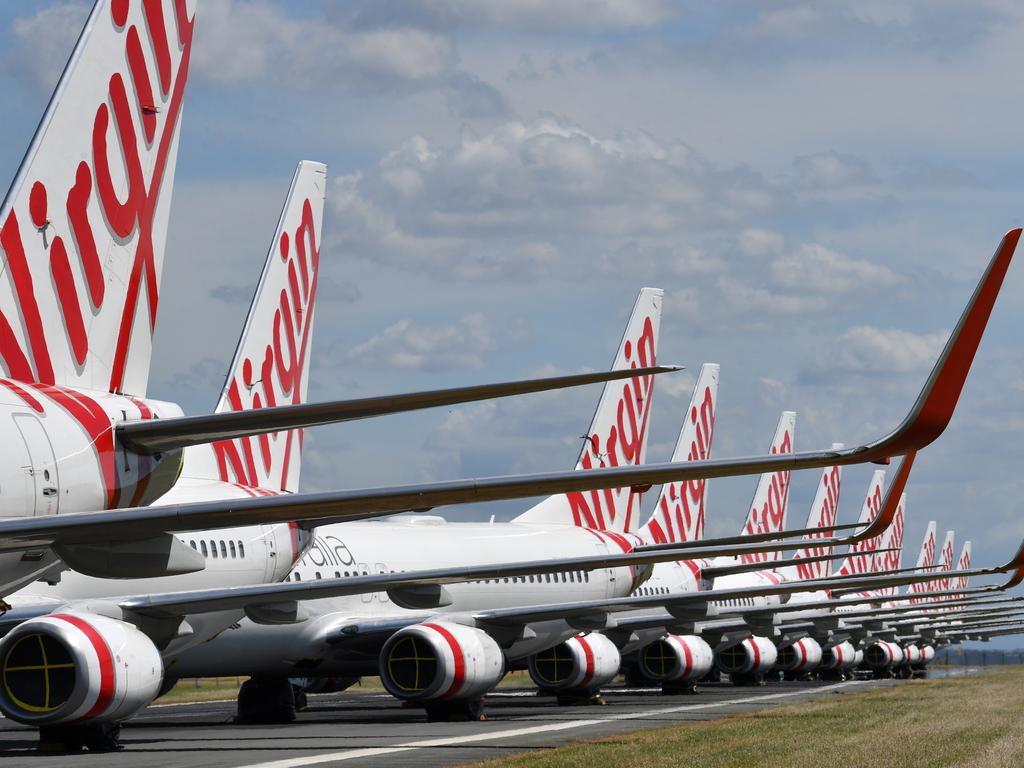No rescue yet for Virgin Australia, so shares to stay suspended
Virgin Australia has asked for its shares to remain suspended for up to seven days as talks continue on a restructuring or rescue.

With Virgin Australia teetering on the brink of collapse, CEO Paul Scurrah has made a video address to staff outlining the extreme challenges the airline is facing and why government assistance is critical to their future.
Hours after trading in the company’s shares was suspended, Mr Scurrah explained to staff that revenue was next to nothing because of travel restrictions imposed by governments but costs continued to mount.
The chief executive said discussions were continuing with the federal government on a $1.4bn loan facility and thanked staff for their hard work in the biggest crisis ever to confront the aviation industry.
Earlier on Thursday, the airline informed the ASX that discussions on financial assistance and restructuring were incomplete and the company was not in a position to make an announcement to the market.
It followed the refusal of major shareholders to agree to a deal to save Virgin Australia and ongoing resistance from the federal government to grant a $1.4bn loan.
Asked again if his government would bail out the carrier, Prime Minister Scott Morrison said any responses would be made on a “sector-wide basis”.
“We appreciate the value of two competitive viable airlines in the Australian economy,” Mr Morrison said.
Treasurer Josh Frydenberg took a similar stance when questioned on the ABC, saying “we’re not in the business of owning an airline”.
“Where our focus has been is on providing industry-wide support,” said Mr Frydenberg.
Virgin Australia has hired insolvency and turnaround experts from Deloitte as well as debt restructuring specialists Houlihan Lokey to help navigate a way through the coronavirus crisis. With Virgin having debts of $5bn, cash reserves of under $900m, mounting costs and barely any income, financial experts believe the best way forward is voluntary administration sooner rather than later.
Debt manager Jonathan Rochford of Narrow Road Capital said the less cash left when insolvency began, the more likely it would be that Virgin would follow in the footsteps of Ansett and “be sold off for scrap”.
“With a decent starting cash balance and in the current economic environment, administrators would have a strong hand to cut a new deal on the greatly reduced number of aircraft that will be needed, reduce staff numbers and cut staff costs back to levels in line with a low-cost carrier, and negotiate with airports for reduced charges,” Mr Rochford said.
“A leaner Virgin, with a lower cost base and greatly reduced liability position, has good prospects of attracting new owners and winning back customers. Only an insolvency can deliver this outcome.”
Another insolvency expert who did not want to be named said there had been many examples of companies going into administration, only to be given a new lease of life with new owners.
He cited Channel 10 as one example, and retailer Harris Scarfe.
“Administration can give companies experiencing financial difficulty some breathing space to stabilise their finances, and allowed them to freeze their debts,” he said.
“It allows more efficient shedding of costs including leases and employee costs, and sets out an orderly process to restart the business.”
On Friday Mr Scurrah will take part in an aviation industry crisis meeting with ALP president Wayne Swan, academics and a raft of union officials.
Qantas CEO Alan Joyce and Deputy Prime Minister Michael McCormack have been invited to take part but are yet to respond.
Others to confirm their attendance include dnata Australia CEO Hiranjan Aloysius, former IFM and Industry Super chair Garry Weaven, Monash University professor Greg Bamber and University of Queensland professor John Quiggin.
ACTU president Michele O’Neil will chair the virtual meeting, which would discuss the sort of regulatory framework needed to deliver sustainable businesses, quality jobs and a reliable service for the travelling public.








To join the conversation, please log in. Don't have an account? Register
Join the conversation, you are commenting as Logout